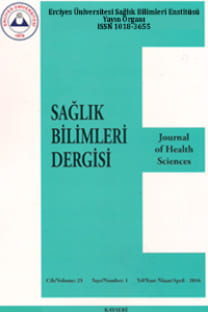HEMŞİRELİK ÖĞRENCİLERİNDE PROBLEMLİ İNTERNET KULLANIMI VE SAĞLIKLA İLİŞKİLİ YAŞAM KALİTESİ ÜZERİNDEKİ ETKİSİ
yaşam kalitesi, Problemli internet kullanımı, hemşirelik öğrencileri, Problematic internet use, quality of life, nursing students
PROBLEM INTERNET USE IN NURSING STUDENTS AND ITS IMPACT ON HEALTH-RELATED QUALITY OF LIFE
___
- Shaheen H M, Farahat T M, Gaber H M. Problematic Internet Use among Medical School Students in Menoufia University Egypt. Journal of Child and Adolescent Behavior. 2016 June; 4:298.
- Zhang M W B, Lim R B C, Lee C, Ho R C M. Prevalence of Internet Addiction in Medical Students: A Meta-analysis. Academic Psychiatry: the journal of the American Association of Directors of Psychiatric Residency Training and the Association for Academic Psychiatry.2018 Feb; 42(1):88-93.
- Younes F, Halawi G, Jabbour H, El Osta N, Karam L, Hajj A, Rabbaa Khabbaz L. Internet Addiction and Relationships with Insomnia, Anxiety, Depression, Stress and Self-Esteem in University Students: A Cross-Sectional Designed Study. PLoS One.2016 Sep; 11(9):e0161126.
- Balhara Y P, Gupta R, Atilola O, Knez R, Mohorović T, Gajdhar W, Javed A O, Lal R. Problematic Internet Use and Its Correlates Among Students from Three Medical Schools Across Three Countries. Academic Psychiatry: The Journal of the American Association of Directors of Psychiatric Residency Training and the Association for Academic Psychiatry.2015 Dec; 39(6):634-638.
- Karaca M. İnternet gençliği: yeni bir gençlik tiplemesi denemesi. e-Journal of New World Sciences Academy Social Sciences: Humanities. 2007;2(4):419-438.
- Yeap J A L, Ramayah T, Kurnia S, Halim H L, Ahmad N H. The assessment of internet addiction among university students: some findings from a focus group study. TehničkiVjesnik. 2015Jan-Feb; 22(1): 105-111.
- Frangos C C, Frangos C C, Sotiropoulos I. Problematic Internet Use among Greek university students: an ordinal logistic regression with risk factors of negative psychological beliefs, pornographic sites, and online games. Cyber psychology, Behavior and Social Networking. 2011Jan-Feb; 14(1-2):51-58.
- Christakis D A, Moreno M M, Jelenchick L, Myaing M T, Zhou C. Problematic internet usage in US college students: a pilot study. BMC Medicine. 2011 Jun; 9:77.
- Islam M A, Hossin M Z. Prevalence and risk factors of problematic internet use and the associated psychological distress among graduate students of Bangladesh. Asian Journal of Gambling Issues and Public Health. 2016 Nov; 6(1):11.
- Desouky D E, Ibrahem R A. Internet Addiction and Psychological Morbidity among Menoufia University Students, Egypt. American Journal of Public Health Research. 2015Oct; 3(5):192-198.
- Mazhari S. Association between problematic Internet use and impulse control disorders among Iranian university students. Cyber psychology, Behavior and Social Networking.2012 May; 15(5):270-273.
- Senormancı O, Saraçlı O, Atasoy N, Senormancı G, Koktürk F, Atik L. Relationship of Internet addiction with cognitive style, personality, and depression in university students. Comprehensive Psychiatry.2014Aug; 55(6):1385-1390.
- Baysan-Arslan S, Cebeci S, Kaya M, Canbal M. Relationship between internet addiction and alexithymia among university students. Clinical and Investigative Medicine. 2016 Dec; 39(6):27513.
- Kuss D J, Griffiths M D, Binder J F. Internet addiction in students: Prevalence and risk factors. Computers in Human Behavior. 2013May; 29 (3): 959–966.
- Shahnaz I, Karim R. TheImpact of internet addiction on life satisfaction and life engagement in young adults. Universal Journal of Psychology. 2014;2:273- 84.
- Yin S, Njai R, Barker L, Siegel P Z, Liao Y. Summarizing health-related quality of life (HRQOL): development and testing of a one-factor model. Population Health Metrics. 2016 Jul; 14:22.
- Fatehi F, Monajemi A, Sadeghi A, et al. Quality of life in medical students with internet addiction. Acta Med Iran. 2016; 54: 662-666.
- Kalkan B, Bhat CS. Relation ships of problematic internet use, online gaming, and online gambling with depression and quality of life among college students. International Journal of Contemporary Educational Research. 2020; 7: 18-28.
- Chern KC, Huang JH. Internet addiction: Associated with lower health-related quality of life among college students in Taiwan, and in whataspects? Comput Hum Behav. 2018; 84: 460-456.
- Barayan S S, Al Dabal B K, Abdelwahab M M, Shafey M M, Al Omar R S. Health-related quality of life among female university students in Dammam district: Is Internet use related? Journal of Family & Community Medicine.2018Jan-Apr; 25(1):20-28.
- Young K S. Internet Addiction: The emergence of a new clinical disorder. Cyber Psychology and Behavior. 1998 Jan; 3: 237–244.
- Bayraktar F. İnternet kullanımının ergen gelişimindeki rolü. Master Thesis, İzmir, Ege University, Social Sciences Institute, 2001.
- Ware J E Jr, Kosinski M, Keller S D. SF-12: How to score the SF-12 Physical and Mental Health Summary Scales, 2nd edition, The Health İnstitute New England Medical Center, Boston, 1995.
- Kocyigit H, Aydemir O, Olmez N, Memis A. Reliability and Validity of the Turkish Version of Short Form-36 (SF-36). Turkish Journal of Drugs Therapeutics.1999 Jan;12(2):102-106.
- Chou C, Hsiao M C. Internet addiction, usage, gratification, and pleasure experience: the Taiwan college students' case. Computers & Education. 2000 Aug; 35: 65-80.
- Kelley K J, Gruber E M. Problematic Internet use and physical health. Journal of Behavioral Addictions.2013Jun; 2(2):108-112.
- Kim J H, Griffiths S M, Lau C H, Fong B Y, Lam J. Pathological Internet use and associated factors among university students in Hong Kong. Hong Kong Medical Journal. 2013 Dec; 19 Suppl 9: 9-11.
- ISSN: 1018-3655
- Yayın Aralığı: Yılda 3 Sayı
- Başlangıç: 1993
- Yayıncı: Prof.Dr. Aykut ÖZDARENDELİ
Türkan ÇALIŞKAN, Yasemin YILDIRIM, Zehra Çiçek FADILOĞLU, Fisun ŞENUZUN AYKAR
COVID-19 HASTALARINDA OBEZİTENİN MORTALİTE ÜZERİNE ETKİSİ
Bilge Nur ÇÖL, Edanur ÇELİK, Müveddet Emel ALPHAN
EBE VE HEMŞİRELERDE MEME KANSERİ KORKUSUNUN SAĞLIKLI YAŞAM BİÇİMİ DAVRANIŞLARINA ETKİSİ
Cansu YILMAZ, Gülseren DAĞLAR, Dilek BİLGİÇ
ÇUKUROVA POPÜLASYONUNDA BIFID MANDIBULAR KANAL PREVALANSI: BIR KIBT ÇALIŞMASI
Berkhas TUMANİ, Hazal DUYAN, Burcu EVLİCE
Burcu CENİKLİOĞLU, Önder DÜZLÜ
KUZEY KIBRIS TÜRK TOPLUMUNDA TOPLUMSAL CİNSİYET ALGISINA YÖNELİK BİR ARAŞTIRMA
Rojjin MAMUK, Ayşe PAYAS, Zeynep KEMALOĞULLARI, Özcan FIRAT, İbrahim Halil GÜLES
Hasan Hüseyin ÇAM, Fatma KARASU
COVID-19 PANDEMİ SÜRECİNDE ÇOCUKLARA YÖNELİK UYGULANAN ŞİDDETİN DEĞERLENDİRİLMESİ
Mukaddes DEMİR ACAR, Selda YÜZER ALSAÇ
ORTOGNATİK CERRAHİ SONRASI OSTEOSENTEZ TİTANYUM MİNİPLAKLARIN ÇIKARILMA NEDENLERİ VE İNSİDANSI
Ömer ÜLKER, Ahmet Emin DEMİRBAŞ, Nükhet KÜTÜK, Erdem KILIC, Alper ALKAN
